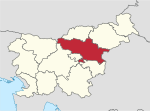Žalec
Cities and towns in Styria (Slovenia)Populated places in the Municipality of ŽalecSavinjska statistical region geography stubs

Žalec (pronounced [ˈʒaːləts] (listen); German: Sachsenfeld) is a town in central Slovenia. It is the seat of the Municipality of Žalec. It lies in the valley of the lower course of the Savinja River west of Celje. The primary economic activity of the region is growing hops, which is reflected by the city's coat-of-arms. The area is part of the traditional region of Styria. The municipality is now included in the Savinja Statistical Region.
Excerpt from the Wikipedia article Žalec (License: CC BY-SA 3.0, Authors, Images).Žalec
Ulica talcev,
Geographical coordinates (GPS) Address Nearby Places Show on map
Geographical coordinates (GPS)
| Latitude | Longitude |
|---|---|
| N 46.250997222222 ° | E 15.163938888889 ° |
Address
Ulica talcev 2
3310
Slovenia
Open on Google Maps










